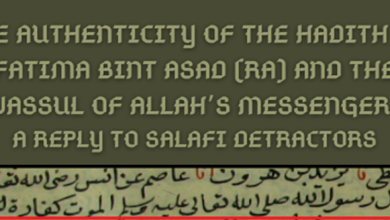Imam Ibn Jahbal and his reply to Ibn Taymiyya’s al Aqida al Hamawiyya on Jiha
The following is an English translation of Imam Ibn Jahbal al-Kilabi’s (d. 733 AH) al-Raddu ‘ala Man Qala bil-Jiha published under the title: The Refutation of Him [Ibn Taymiyya] Who Attributes Direction (Jiha) to Allah. The Introduction was by the late Shaykh Wahbi Sulayman Ghawji (d. 2013), and translation and notes by Dr. Gibril Fouad Haddad. The following is a foreword by Dr. Muhammad Afifi al-Akiti from Oxford, England:
Like the Judaic and Christian theological traditions, the Islamic one also, – arguably with less crassness – faced the problems of scriptural literalism that result in an anthropomorphic theology. As the early (salaf) Muslim community became more sophisticated and began to lead the world in scientific progress – and especially from the time of Islam’s Doctor Angelicus, al-Ghazali (d. 505/1111) – Muslim theologians came to embrace and institutionalize the case for tawil. This was Islam’s systematic solution of the problem, through a canon of figurative interpretation of scripture as a necessary tool of hermeneutics.
Not only did the method of tawil keep anthropomorphism in check through offering a middle way in the understanding of Divine Attributes as limited by human language, but it served to reconcile Divine Scripture with the discoveries afforded by human reason. This legitimization of tawil by the classical ‘ ulama and its systematic treatment in the Golden Age of Islam made it an established doctrine among Muslim theologians. It became the standard position in later (khalaf) orthodoxy within the Sunni tradition (alongside the formerly dominant, simpler alternative, and utterly unexplainable “non-method”: tafwid) – the cultural milieu that brought forth this work.
This short theological tract, Fi Nafi al-Jiha, or On Denying Direction to God, by the Ash’ari theologian and celebrated Shafi’i jurist, Qadi Ibn Jahbal (d. 733/1333), is a clinical rebuttal of the controversial fatwa, the ‘Aqida Hamawiyya, penned by his legendary contemporary, Ibn Taymiyya (d. 728/1328). It is considered, rightly, a classic manifesto of anti-literalism, which embraces the successful pro-tawil Ghazalian theses advocated centuries earlier – to the extent that Ibn al-Subki (d. 771/1370) reproduced the whole of Ibn Jahbal’s work in his magisterial Tabaqat.
The present volume is a special “all-Damascene” edition, which contains the very first (and definitive) English translation of Ibn Jahbal’s Arabic text; completed by an authorized, nay Damascus-trained and native scholar, Shaykh Gibril Fouad Haddad, who possesses the complete and exclusively Dimashqi ijaza going back to the original Damascene author; and supplemented by superb scholarly documentation and a running commentary. The volume includes the Muqaddima of one of Damascus’s senior living Hanafi jurists, Shaykh Wahbi Sulayman Ghawji, which presents an up-to-date explanation of figurative interpretation in Islamic theology The volume is also prefaced by another introduction, which catalogues the problematic positions of the redoubtable Ibn Taymiyya raised by scholars throughout the ages including his own students, regarding which a Dimashqi muhaddith recently quipped: “The mistakes of the great are the greatest mistakes.”
This convenient Collectio Errorum by Shaykh Haddad is not a zero-sum critique. In fact, it will be appreciated for it isolates Ibn Taymiyya’s unquestionably controversial materials from the rest of his vast corpus – thus enabling one to take the good and leave the bad; and this list will be a service to the non-scholar who might want to benefit from reading the works of this prolific Hanbali jurist, one who is now enjoying a greater following and who indeed can be said to be a phenomenon of present-day Islam.
Along with a work by an earlier Hanbali theologian, the Daf Shubah al-Tashbih of Ibn al-Jawzi (d. 597/1200), this medieval contribution by Ibn Jahbal remains one of the most important texts refuting the anthropomorphists of the Muslim world. This will be an indispensable reference for advanced students of Islamic theology, other professional theologians, and modern academics needing primary source materials in English or a source book on the controversies surrounding Ibn Taymiyya’s theology.
This same work embodies, moreover, a contemporary exercise in polemic representing the longstanding views in the conformist tradition of Muslim theology, whether via tawil or tafwid, and whether in the schools of the Ash’aris, Maturidls or Hanbalis. In particular, it pits itself against one of the two opposite non-conformist readings of the Qur’an and Sunna; and in general, it highlights the pitfalls of a literalistic mindset which plagues all scripturally-based religions.
Muhammad Afifi al-Akiti
Research Fellow in Islamic Theology, Oxford Centre for Islamic Studies, Oxford University.
CONTENTS
Translator’s Introduction
Ibn Jahbal al-Kilabi 11
The Controversy Surrounding Ibn Taymiyya’s Orthodoxy 13
The Sunni Stand Against Anthropomorphism 15
Ibn Taymiyya’s Life and Teachings 27
Al-‘ Ala’is Summary of Ibn Taymiyya’s Deviations 28
His Teachers and Students 31
Divided Opinions Concerning Him 32
Al-Dhahabi’s Synopsis of His Case 34
“He was Very Learned but Lacked Intelligence” 3 5
The Hanbalis’ Prohibition Against Him Giving Fatwa 36
The Fatwa Hamawiyya Attributing Direction to Allah 37
His Several Imprisonments 39
His Equivocations Under Interrogation 40
Al-Tufi’s Summary of Ibn Taymiyya’s Deviations 41
His Former Admiration of Shaykh Muhyl al-DIn Ibn ‘Arab! 44
His Sufi Affiliation with the Qadiri Tarlqa 45
His Innovative Nullification of Triple Divorce 48
Ibn Rajab Supports then Rejects His Fatwa on Divorce 49
His Prohibition of Travel to Visit the Holy Prophet 50
The Hanbali Rejection of this Fatwa 51
Shaykh al-Islam al-Subki’s Rejection of this Fatwa 52
Shaykh al-Islam al-Iraqi’s Rejection of this Fatwa 53
Shaykh al-Islam Ibn Hajar’s Rejection of this Fatwa 54
Hafiz al-Safadi’s Rejection of this Fatwa 54
Hafiz al-Qarfi’s Rejection of this Fatwa 55
Imam al-Kafaji’s Rejection of this Fatwa 56
Other Rejections of this Fatwa 56
Muhammad Ibn ‘Abd al-Hadi’s Fanatic Defense of His Teacher 57
The Hadith “Whoever Visits My Grave, My Intercession is Guaranteed for Him” 59
His Last Days and Repentence from His Activities 64
His Abandonment by His Former Admirers 65
His Revival of Ibn Hazm’s Vicious Style 67
His Excessive Involvement in Kalam and Philosophy 68
Al-Dhahabi’s Bayan Zaghl al-‘Ilm and His Nasiha to Ibn Taymiyya 69
Al-Subki’s Summary of Ibn Taymiyya’s Deviations in Doctrine 72
Al-Haytamis Summary of Ibn Taymiyya’s Deviations 73
Ibn Taymiyya’s Incredulity of Imam Ahmad’s Fatwa on Tabarruk with the Prophetic Grave 77
His Denial of Tawassul and His Denial of Such Denial 78
His Invention of a Post-Conversion Reconversion of al-Ash‘ari 79
Al-Kawtharls Scathing Exposure of His Anthropomorphism 80
Ibn Taymiyya’s Denial of the Eternity of Hellfire 84
His Invention of a Double or Triple Tawhid 86
Al-Tubbani’s Refutation of His Multiple Tawhids 87
Ibn Taymiyya’s Verbose Methodology in Disputation 90
His Climbing Down the Pulpit to Illustrate the Divine Descent 94
His Appearance 95
The Revival of His Teachings by the Wahhabi Movement 95
Selected Taymiyyan Heresiographical Literature 100
Al-Nabhani’s Verdict on Ibn Taymiyya 105
Shaykh Wahbl Sulayman Ghawji’s Introduction 107
The Salaf, the Khalaf, Ta’wil and the Correction of Errors in ‘Aqida 107
The Salaf 107
The Khalaf 110
Ta’wil 115
Preconditions for Accepting Ta’wil 118
The Later Need for Ta’wil According to Ahl al-Sunna 123
Ta’wil Does Not Mean Negation of the Attributes 125
Putting to Rest Certain Insinuations and Warning of
Certain Scholarly Errors That Pertain to Doctrine 128
Ibn Jahbal: Refutation of Him Who Attributes Direction to Allah 145
Chain of Transmission for this Book 147
Author’s Introduction 151
The Hashwiyya or Vulgar Anthropomorphists 153
Malik and Shafi’is Understanding of Tawhid 160
The Ash’aris are Closer to the Salaf than the Hashwiyya 162
The Doctrine of Ahl al-Sunna 164
The Requisites of Transcendence (Wazaif al-Taqdis) 171
Refutation of Ibn Taymiyya’s Claims
Preliminaries 173
Chapter One: The Fallacy of His “Proofs from the Qur’an”
and the Hashwiyya s Self-Contradictions 177
Chapter Two: The Fallacy of His “Proofs from the Sunna” 189
Chapter Three: Parenthesis: His Understanding of
the Withness (ma’iyya) and Height of Allah ” 195
Chapter Four: His Peculiar Understanding of “with,” “in,’’“above,” and “on” 203
Chapter Five: His Understanding of the Heaven to Mean “the Height” 207
Chapter Six: His Rhetoric Against the Mutakallimun 217
Chapter Seven: The Absurdity of His Literalism 221
Chapter Eight: His Calumnies Against the Sunni Theologians 227
Chapter Nine: His Attribution of Unbelief and Heresy to the Ulema 233
Chapter Ten: His Unreliable Manner of Quoting the Salaf 237
Chapter Eleven: [Imam al-Ghazzali’s] Ethics of Tawhld 257
Upholding Divine Transcendence 258
Belief and Confirmation 259
Admission of Incapacity 260
Keeping Silent 260
Refraining from Paraphrasing 262
Ceasing Cogitation 263
Believing Firmly in the Knowledge of the Prophet 263
Chapter Twelve: Kalam Dialectic in the Qur’an and the Rejection of Imitation 265
Chapter Thirteen: Warnings of the Great Sufi Shaykhs against Literalism 269
Chapter Fourteen: Leave Quranic Exegesis to its Experts 273
Chapter Fifteen: Quranic Proofs Negating Direction 275
Chapter Sixteen: Qur’an and Sunna Yield No Evidence for Anthropomorphists 279
Appendix I: Ibn Qayyim al-Jawziyya 283
Appendix II: Shaykh Wahbl Sulayman Ghawji al-Albani: A Brief Bio-Bibliography 297
Bibliography 303
Indexes 325
Index of Quranic Verses 327
Index of Narrations 329
General Index of Arabic Terms, Names and Works 333
Download the full work – HERE
Read online:





